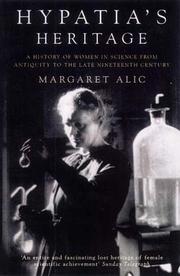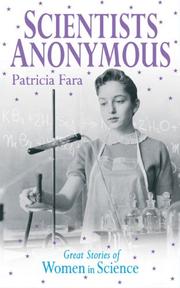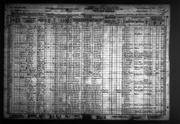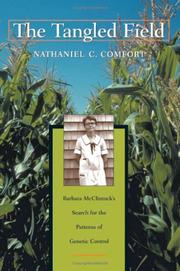| Listing 1 - 10 of 47 | << page >> |
Sort by
|
Periodical
Abstract | Keywords | Export | Availability | Bookmark
 Loading...
Loading...Choose an application
- Reference Manager
- EndNote
- RefWorks (Direct export to RefWorks)
Teaching --- Pure sciences. Natural sciences (general) --- Education --- Exact sciences --- Netherlands

ISBN: 0704339544 Year: 1986 Publisher: London The Women's Press Ltd
Abstract | Keywords | Export | Availability | Bookmark
 Loading...
Loading...Choose an application
- Reference Manager
- EndNote
- RefWorks (Direct export to RefWorks)
Sociology of the family. Sociology of sexuality --- Pure sciences. Natural sciences (general) --- History --- Exact sciences --- Book
Book
Year: 2009 Publisher: Luxembourg Publications Office of the European Union
Abstract | Keywords | Export | Availability | Bookmark
 Loading...
Loading...Choose an application
- Reference Manager
- EndNote
- RefWorks (Direct export to RefWorks)
Sociology of occupations --- Pure sciences. Natural sciences (general) --- History --- Academic sector --- Exact sciences --- Biographical details --- Book
Book
Publisher: Place of publication unknown publisher unknown
Abstract | Keywords | Export | Availability | Bookmark
 Loading...
Loading...Choose an application
- Reference Manager
- EndNote
- RefWorks (Direct export to RefWorks)
Sociology of occupations --- Pure sciences. Natural sciences (general) --- Academic sector --- Exact sciences --- Book --- Courses

ISBN: 1840465743 Year: 2005 Publisher: Thriplow Icon books
Abstract | Keywords | Export | Availability | Bookmark
 Loading...
Loading...Choose an application
- Reference Manager
- EndNote
- RefWorks (Direct export to RefWorks)
Wetenschap saai? Wetenschap niets voor meisjes? Vrouwelijke wetenschappers een contradictio in terminis? Deze bundeling biografieën over wetenschapsters spreekt al die vooroordelen tegen. Veel bekende vrouwen zoals Marie Curie en Rosalind Franklin komen aan bod. Maar ook vele toegewijde, briljante maar minder bekende wetenschapsters worden vanonder het stof gehaald. Zij hadden allemaal gemeen dat ze zich in een door mannen gedomineerde wetenschapswereld met al haar obstakels een plaats veroverden. Het boek begint met de levensverhalen van een aantal leergierige vrouwen uit de 17e eeuw. Zo was er Louise Bourgeois (1563-1636) een vroedvrouw die ook een medisch handboek schreef en zich zo op mannenterrein begaf. Haar handboek werd in verschillende talen vertaald.
Sociology of occupations --- Pure sciences. Natural sciences (general) --- History --- Academic sector --- Exact sciences --- Biographical details --- Book
Book
Year: 1999 Publisher: London Granta Books
Abstract | Keywords | Export | Availability | Bookmark
 Loading...
Loading...Choose an application
- Reference Manager
- EndNote
- RefWorks (Direct export to RefWorks)
Sociology of occupations --- Pure sciences. Natural sciences (general) --- Academic sector --- Exact sciences --- Biography --- Book --- Hodgkin, Dorothy
Book
ISBN: 9080012254 Year: 1996 Publisher: Utrecht Centrum Vrouwen en Exacte Vakken
Abstract | Keywords | Export | Availability | Bookmark
 Loading...
Loading...Choose an application
- Reference Manager
- EndNote
- RefWorks (Direct export to RefWorks)
Wetenschap, en vooral de exacte wetenschap, heeft in het verleden vrouwen zelden een beboterde boterham opgeleverd. Ondanks de toenemende historische kennis over het aandeel van vrouwen in de exacte wetenschap, zoals de miniaturen van dit boek duidelijk laten zien, waren de vooroordelen tegen vrouwelijke intelligentie zo sterk dat maar weinig vrouwen het konden maken in de wetenschap. Omdat de carrièremogelijkheden voor vrouwen beperkt bleven, was de wetenschap voor hen vooral een passie, een keuze en een roeping. Uit de levensgeschiedenissen in dit boek komen gedreven vrouwen naar voren die zich vanuit diepe interessen en innerlijke overtuiging hebben gewijd aan wetenschappelijk onderzoek. Het is vooral aan hun toewijding, visie en motivatie te danken dat vrouwelijke wetenschappers in staat waren om, ondanks alle moeilijkheden, toch zoveel te bereiken.
Sociology of occupations --- Didactics of sciences --- Pure sciences. Natural sciences (general) --- History --- Academic sector --- Exact sciences --- Biographical details --- Book

ISBN: 0472111078 Year: 1999 Publisher: Ann Arbor The University of Michigan Press
Abstract | Keywords | Export | Availability | Bookmark
 Loading...
Loading...Choose an application
- Reference Manager
- EndNote
- RefWorks (Direct export to RefWorks)
Sociology of occupations --- Pure sciences. Natural sciences (general) --- Human medicine --- Medical sciences --- Academic sector --- Exact sciences --- Biography --- Book --- Stewart, Alice
Book
Year: 1996 Publisher: Sheffield Women in Technology
Abstract | Keywords | Export | Availability | Bookmark
 Loading...
Loading...Choose an application
- Reference Manager
- EndNote
- RefWorks (Direct export to RefWorks)
Dit boek bevat een naamlijst van alle vrouwen die zich in Europa met wetenschappen, techniek en technologie inlaten, geranschikt naar land en per sector.
Sociology of occupations --- Pure sciences. Natural sciences (general) --- Engineering sciences. Technology --- Technology --- Academic sector --- Exact sciences --- Biographical overview --- Book --- Europe

ISBN: 0674011082 0674004566 Year: 2001 Publisher: Cambridge Harvard University Press
Abstract | Keywords | Export | Availability | Bookmark
 Loading...
Loading...Choose an application
- Reference Manager
- EndNote
- RefWorks (Direct export to RefWorks)
This biographical study illuminates one of the most important yet misunderstood figures in the history of science. Barbara McClintock (1902-1992), a geneticist who integrated classical genetics with microscopic observations of the behaviour of chromosomes, was regarded as a genius and as an unorthodox, nearly incomprehensible thinker. In 1946, she discovered mobile genetic elements, which she called "controlling elements." Thirty-seven years later, she won a Nobel Prize for this work, becoming the third woman to receive an unshared Nobel in science. Since then, McClintock has become an emblem of feminine scientific thinking and the tragedy of narrow-mindedness and bias in science. Using McClintock's research notes, available correspondence, and dozens of interviews with McClintock and others, Comfort argues that, contrary to various accounts, including Keller's, McClintock's work was neither ignored in the 1950s nor wholly accepted two decades later. Nor was McClintock marginalized by scientists; throughout the decades of her alleged rejection, she remained a distinguished figure in her field. This biographical study illuminates one of the most important yet misunderstood figures in the history of science. Barbara McClintock, a geneticist who integrated classical genetics with microscopic observations of the behaviour of chromosomes, was regarded as a genius and an unorthodox thinker.
Women geneticists --- Pure sciences. Natural sciences (general) --- Genetics --- Sociology of occupations --- McClintock, Barbara --- Geneticists --- Women biologists --- McClintock, Barbara, --- Academic sector --- Exact sciences --- Biography --- Book
| Listing 1 - 10 of 47 | << page >> |
Sort by
|

 Search
Search Feedback
Feedback About UniCat
About UniCat  Help
Help News
News